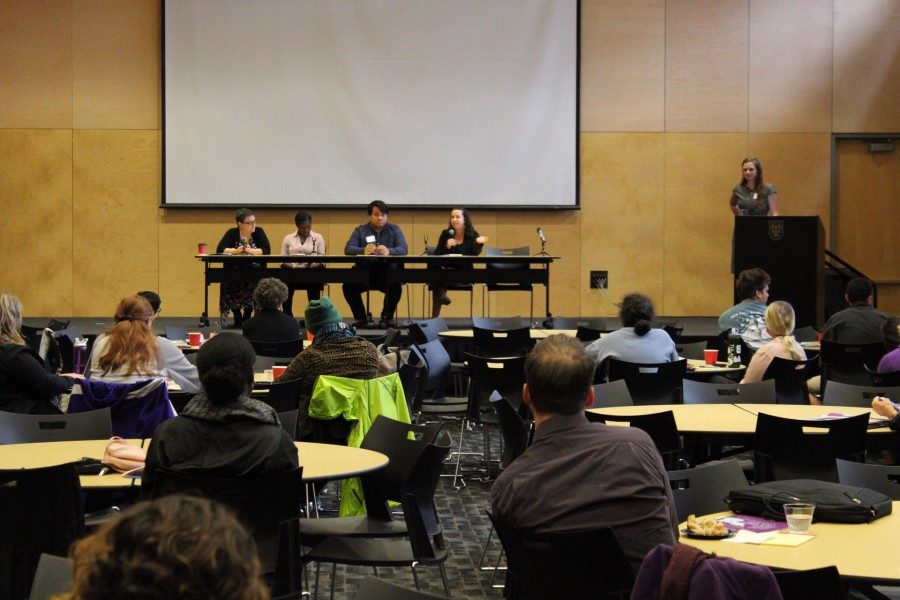Tulane hosts second annual Louisiana Sexual Assault Student Activist Awareness Conference
In the early morning of Oct. 28, students, administrators and members of the New Orleans community piled into the Lavin-Bernick Center of University Life to speak out against sexual violence on college campuses.
Tulane University was hosting the second annual Louisiana Sexual Assault Student Activist Awareness Conference. From 9 a.m. to 6 p.m., speakers, students and faculty showed up for the 9-hour event to give advice, share stories and make progress in combating the issue of sexual violence on college campuses.
Sponsored by the Newcomb College Institute, the second annual LSASAC included speakers, panel discussions, workshops, resource fairs and networking opportunities. The conference offered a casual and collaborative environment for members of the community to gather and share their experiences about sexual violence and activism.
“We’re seeing that activists and students really care, but I think that there need to be more spaces on campus that are inclusive that anyone can join, like this conference that was free,” student coordinator of LSASAC Helen Robins said.
The conference featured a networking opportunity for the Tulane community to meet activists and learn about the resources offered by organizations on campus.
One of the organizations present was Sexual Trauma Awareness and Response, a stand-alone sexual assault crisis center with an office in New Orleans. STAR serves survivors of sexual violence, primary and secondary, and offers counseling and legal advice services all free of cost. In addition to STAR, members of Lift Louisiana, Feminist Majority Foundation and Tulane’s Sexual Aggression Peer Hotline and Education tabled at the event.
SAPHE, a well-known organization on Tulane’s campus, offers workshops to organizations upon request.
“[SAPHE] runs a peer-run hotline that all students and faculty can call into to if they’ve had an experience that they need to talk about, and we’re able to connect them to both campus and community-wide resources,” sophomore and SAPHE member Christina Krisberg said.
The conference also hosted several speakers. The keynote speaker, Wagatwe Wanjuki, is a feminist writer, speaker and activist based in the New York City area. Wanjuki is the co-founder of Survivors Eradicating Rape Culture.
The conference additionally included a panel discussion based on policy work and breaking down the barriers between voters and legislators with regard to policy against sexual assault.
“When it comes to these Title IX provisions everyone meets, it’s not a Republican issue, it’s not a Democratic issue, it’s just a people issue,” Margaret Martin, second-year Tulane Law student, said. “The policies that our legislators are voting on affect everyone, not just survivors of sexual assault.”
The conference included breakout sessions that featured speakers and artists from the New Orleans area. One session included a performance art piece by actress Lauren Hind and director Riot Mueller. “Sexual Healing: A Work in Progress a Multimedia Performance Space for Survivors and Their Allies” featured Hind in a raw state of emotion battling the trauma of her sexual assaults, while also taking control of her narrative.
“There are survivors that never tell their story,” Hind said.
She said working creatively with a director and fellow survivor, however, has allowed her to take charge of her life. Hind also said performance art has given her the chance to heal.
“[To] take something so terrible and turn it into something beautiful — because to me that’s how I’m going to survive like that’s what’s going to keep me alive, keep me going,” Hind said.
Student coordinator of the conference Helen Robins was very excited to see the turnout for this year’s conference.
“The first year was primarily administrators for education institutions, but this year it was mostly students, and not just students from traditionally activists clubs or spaces, it was students from all over campus,” Robins said. “I’m really excited to see where the conference goes in the future now that students have demonstrated their interest.”
Your donation will support the student journalists of Tulane University. Your contribution will allow us to purchase equipment and cover our annual website hosting costs.

















Leave a Comment